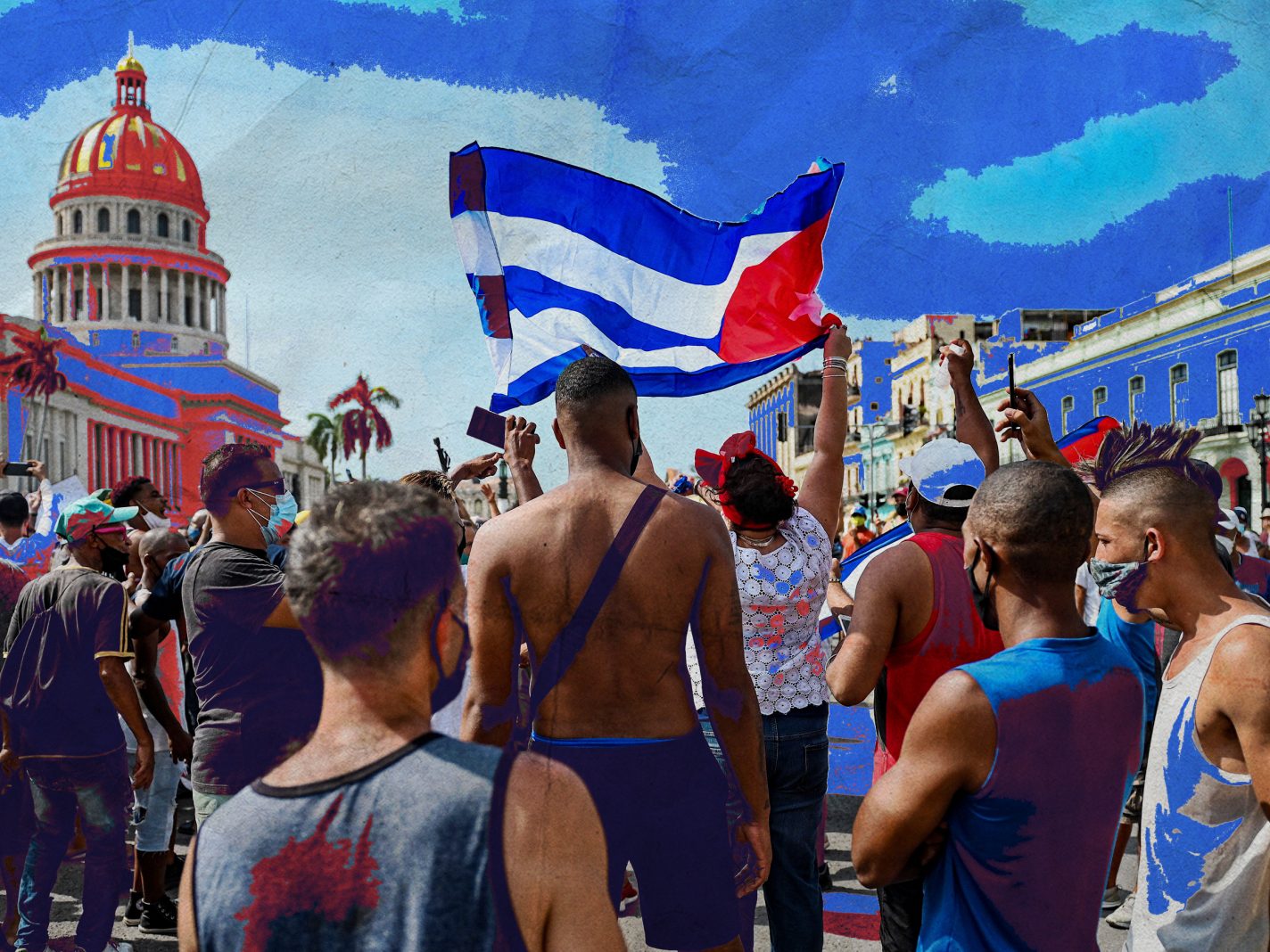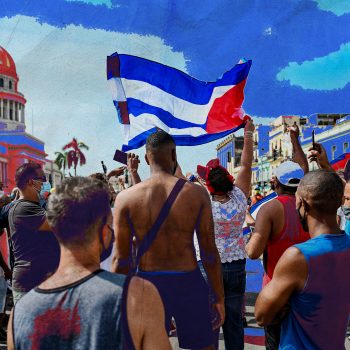The protests erupting across Cuba continue this week as the country’s citizens stand up against the communist regime. These demonstrations come as a call to end Cuba’s decades-old dictatorship — and oppression aggravated by the growing economic crisis, which has led to worsened living conditions, power outages, a rise in COVID-19 infections, price hikes, and a lack of food and medicine.
Being the island’s largest unrest in over 60 years, it didn’t take long for Cuba’s President Miguel Díaz-Canel to speak out. He called the protestors “counter-Revolutionaries” and urged communist supporters and militants to “take back the streets” from protestors.
From the White House, U.S. President Biden said that the “Cuban people are demanding their freedom from an authoritarian regime” that has been in power since 1959. “We stand with the Cuban people and their clarion call for freedom and relief from the tragic grip of the pandemic and from the decades of repression and economic suffering,” Biden said in a statement. “The Cuban people are bravely asserting fundamental and universal rights.”
Since the protests started, the Cuban government has reportedly restricted access to the internet, telephone services, and messaging and social media apps, including Facebook and WhatsApp. According to The Wall Street Journal, this shutdown is to stop the spread of information and media into, out of and within the country. Remezcla spoke with some Cuban music artists, industry professionals, and more — with some based out in Cuba — to give them a platform to speak openly about what is happening in their home country.
El Individuo
“If the people are rising up, it’s because there are demands that the government has to listen to. Before, it would be two or three people protesting. This time, it’s the people of Cuba in general. I support my people — apoyo a los míos. What I will never support are the people who are inciting violence from outside of Cuba.”
Cuban rapper El Individuo said the Cuban people are taking a stand and demanding that their government listen to them. He stresses that it is now up to Cubans to create the change they want. “I personally feel that nobody from the outside came come to solve our problem,” El Individuo tells Remezcla. “We can do it ourselves.”
El Individuo adds that this is all much more complicated than it seems — and explains the need for a leader who can communicate their demands to the state. “The lack of direct communication between the government and its people worries me because I feel that all those who are marching have different ideas,” he says. “Some don’t even know why they are fighting.”
José Ángel Blanco Padilla (El Negro Wadpro)
For musician José Ángel Blanco Padilla, also known as El Negro Wadpro, the problems in Cuba stem from the lack of social support from the government and its desire for totalitarian power, which includes physical, verbal, and psychological abuse and a violation of rights. “If you are not a communist or are linked in some way to the communist revolution, you will never have any support or respect from the government,” Padilla tells Remezcla. “It is horrible to live in terror of what may happen to you for simply expressing your opinion.”
Leydisvel Freire (DJ Leydis)
DJ Leydis migrated to the United States from Cuba in 2006. “I left Cuba, leaving behind all my loved ones, my daughter at only four years old. The next time I saw her, she was 11 years old, just because I wanted a better future for her and my loved ones, and nobody knows what I suffered in those ten years of Cuba not letting me enter my country just for thinking differently.”
She continues, “But what about these people who do not want to leave Cuba? Who love their Cuba? Cuba being the only place that represents them and gives them life? Where our government turns its back on us and mistreats us, what is there for these people? What do we tell the world about this? That it’s because of a ‘blockade’?”
While she agrees that the U.S. needs to end its trade embargo on Cuba — she stresses that this is much bigger than that. “What the world does not know is the need and misery being experienced in Cuba right now, and our people are already tired,” she exclaims. “If there is no food for some, there cannot be for others, and if some of us are going to starve to death, we all die. That is why people are in the streets.”
Ultimately, DJ Leydis makes one thing clear: “I am on the people’s side, and I will support my people with their call to action and their voices — until the end, no matter what.”
Edgaro González (Music Producer & DJ)
Music producer Edgaro González believes the “right to protest and freedom of expression are universal.” He sees the current protests as Cubans’ way to “raise their voices and discontent with the government and its leaders.”
He wants the government to start listening to what the people of Cuba have to say. He also wants restrictions on the internet to be lifted, so people outside the country can get information and see “what’s really happening” inside Cuba. “It is our duty to amplify the truth, and it always comes from the ones who fight,” González tells Remezcla. “The truth never comes from the repressor.”
The best way to support Cubans at this moment? “Listen to what the people of Cuba have to say,” urges González. “Amplify the voice of the people.”
Loren Medina (Public Relations Professional)
Loren Medina, the owner of Guerrera Marketing & PR, recalls stories from her Cuban father, who, at the age of 14, was imprisoned for being part of the anti-revolutionary organization MRR (Movimiento Recuperación Revolucionario) and fighting against Fidel Castro’s Revolución. She said it’s “triggering” for her and her father to see Cuban teenagers taken by force by the government to join the regime against their will.
“For myself, it’s the transgenerational trauma that my Cuban family experienced as political prisoners, leaving their patria, and never being allowed to return,” Medina tells Remezcla. “Despite the government’s violent reprisal of beating, imprisoning, and even killing protestors, people are no longer afraid. They are aware they’ve been spoon-fed lies and have been oppressed by their own government, not just by the United States embargo.”
Sixty-two years after La Revolución, Medina said the world is witnessing the collapse of Cuba’s “revered” health care system that the dictatorship promoted via communist propaganda. Without enough doctors in Cuba to treat patients with COVID-19 and with widespread access to the internet to voice their anger, Medina calls it a “perfect storm” and why people are now fighting back. “The pandemic was a huge blow to Cuba’s economy, which mostly survives from tourism,” she said. “This was the breaking point. This is a historic moment.”
We will continue to update this piece with any further statements. If you are an artist, publicist, etc. within the music industry and are interested in sharing a statement, please feel free to reach out to joel@remezcla.com.




